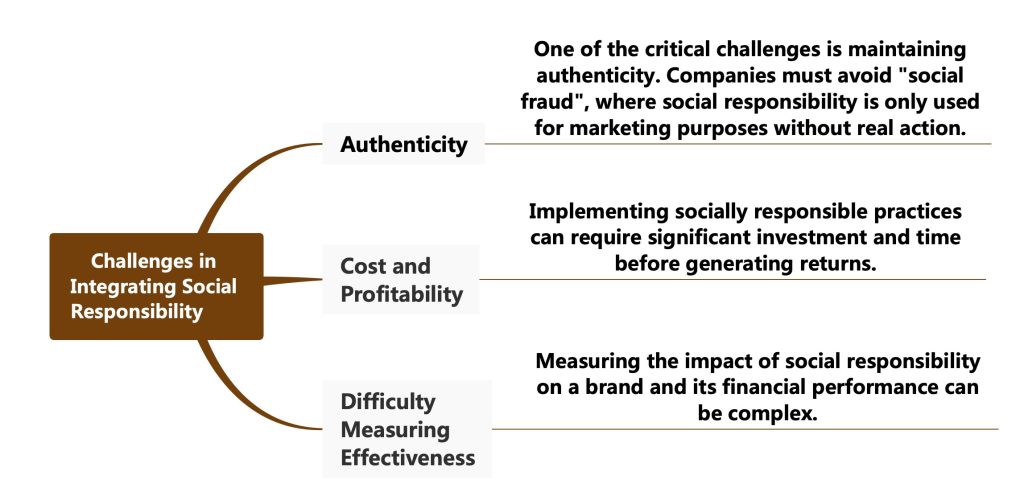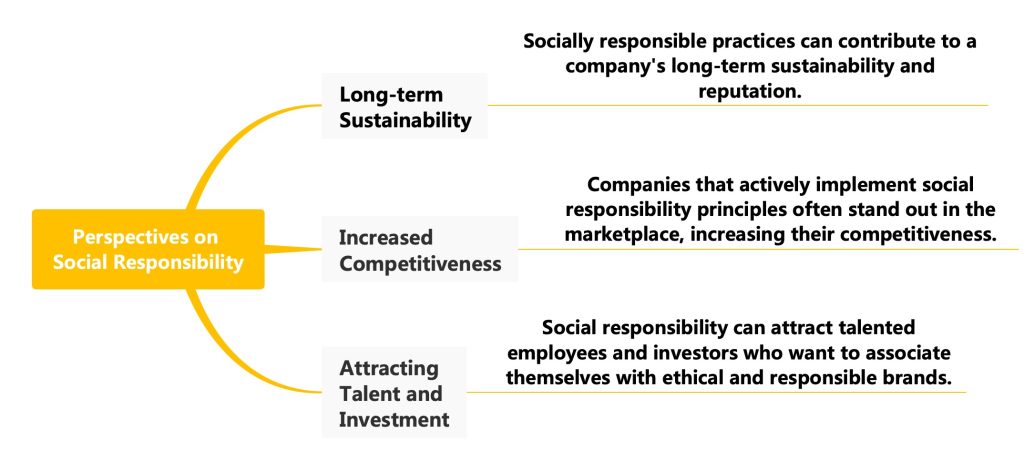Brands with a mission are rewriting the rules of business.
Social responsibility has become essential to companies’ marketing strategies in today’s business world. This area of business development is of growing interest to consumers, who seek quality products and services and expect brands to participate in social life and care about the well-being of society and the environment.
The question facing companies today is: Why has social responsibility become such an important factor for consumers, and how has it influenced their preferences and choices? How do companies incorporate social responsibility principles into their marketing strategies to attract attention and create trust among their target audience? And what challenges and prospects does social responsibility offer for brands in today’s marketing world?
The answers to these questions will help us understand how social responsibility has become integral to business strategy and marketing, influencing the relationship between brands and consumers.
The history of social responsibility in business

Social responsibility has been introduced previously in the business world. It has its roots in the distant past when companies began to recognise their role as economic and social actors.
Social responsibility was often limited to philanthropy and charity in the last century. Large corporations created foundations and supported various social projects and programmes.
Over time, the understanding of social responsibility began to change. It is no longer just about philanthropy but also about ethically doing business, respecting human rights, caring for the environment and supporting sustainable development.
Today, social responsibility encompasses a wide range of actions, from sustainable production to creating equal opportunities for all segments of society. Moreover, it has become integral to brand identity and corporate culture.
Current trends in social responsibility

These days, social responsibility has become an integral part of many companies’ marketing strategies. This section explores which aspects of social responsibility are most relevant today and how they affect business strategies.
- Sustainability and the environment:
Companies actively adopt sustainable practices, including renewable energy, reducing carbon footprint, and recycling. For example, Microsoft has announced its goal to become “carbon negative” by 2030.

- Equality and inclusion:
Many brands promote equality and inclusion in the workplace and their marketing campaigns. This includes supporting diversity and fighting discrimination.
- Supporting local communities:
Companies invest resources in local communities by supporting small businesses and social projects. For example, Warby Parker, through its ‘Buy a Pair, Give a Pair’ programme, donates glasses to those in need, distributing over 10 million pairs.

- Focus on health and well-being:
Caring for the health of employees and customers has also become an essential part of social responsibility. This includes offering a healthy working environment and promoting products that encourage healthy lifestyles.
- Transparency and accountability:
Companies emphasise transparency in their operations, including supply chain and production processes, increasing consumer and partner trust.
- Training and development:
Some companies focus on educational initiatives, offering training and professional development programmes for employees and the general public.
Examples of companies demonstrating social responsibility
This section will look at specific examples of companies that have successfully integrated social responsibility into their marketing strategies, showing how this can lead to positive changes in society and business.
Dean’s Beans: This coffee company uses products for positive change by maintaining long-term relationships with coffee growers and participating in developing economic, environmental and social projects in coffee-growing regions.

Ben & Jerry’s: The company actively supports global issues such as refugee rights and climate justice by partnering with non-profit organisations and foundations to help social change.

Subaru and #SubaruLovesPets: The company has an initiative to support adopting animals with special needs, including promoting the idea through social media and partnering with animal adoption organisations.

These examples show how companies across industries use their resources and influence to promote social responsibility, making meaningful contributions to society and creating a positive brand image.
Influencing consumers
let’s explore how social responsibility affects consumers’ brand perceptions and purchase decisions.
- Increasing trust and loyalty: When a company demonstrates social responsibility, it often increases consumer trust and loyalty. Consumers who recognise the importance of sustainable and ethical practices tend to support those brands that share their values.
- Impact on purchase decisions: Research shows that consumers increasingly choose products and services from companies actively involved in social and environmental initiatives. This is especially true among younger shoppers, for whom social responsibility is essential when selecting brands.
- Improving brand perception: Social responsibility can significantly improve a company’s image in the eyes of the public. Companies actively participating in social campaigns are often perceived as more caring and trustworthy.
- Impact on public opinion: Socially responsible actions by companies can have an impact not only on consumers but also on public opinion in general. Companies that take a proactive stance in supporting socially responsible initiatives become opinion leaders in their industries.
- Stimulating social change: Companies that demonstrate social responsibility can stimulate positive social change by inspiring other organisations and individuals to take similar actions.
In this way, social responsibility plays a crucial role in shaping the relationship between companies and consumers, influencing commercial success, public perception, and long-term brand development.
Challenges and perspectives
When integrating social responsibility into marketing strategies, companies face several challenges and discover new perspectives.


Social responsibility is a challenging but important area in modern business. Companies that can effectively overcome these challenges will discover new opportunities to grow and strengthen their position in the marketplace.
The future of social responsibility in marketing
Social responsibility will play an increasingly important role in companies’ marketing strategies as society evolves. Let’s take a look at future trends and potential changes in this area:
- Companies are expected to continue to focus on environmental sustainability to minimise their carbon footprint and move towards more sustainable production practices.
- Advanced technologies such as artificial intelligence and big data can help companies implement and track their socially responsible initiatives more effectively.
- Consumers will demand greater transparency and accountability from companies regarding social responsibility, which could lead to the standardisation of reporting and impact assessment.
- Social responsibility will become integral to corporate strategy rather than just a standalone initiative or marketing ploy.
- The growth of cross-industry and cross-corporate partnerships to address social and environmental issues will become a key development area.
- Increased consumer engagement with companies’ socially responsible initiatives, possibly through social media platforms and interactive campaigns.
- Growth in global social responsibility, where companies will focus on local and international social and environmental issues.
Looking to the future of social responsibility in marketing offers exciting opportunities for companies looking to succeed financially and create a positive impact on society and the environment.
Final thoughts
After our review, it is clear that social responsibility is not just a fashion trend but a fundamental part of modern marketing. Companies that take their commitment to society and the environment seriously win in the eyes of consumers by enhancing their reputation and creating long-term customer relationships.
Social responsibility is now a key factor influencing consumer decisions and brand loyalty. Companies that successfully integrate these principles into their strategies can expect increased profits and improved social well-being.
In the future, we expect social responsibility to become an even more critical part of corporate culture and strategy as companies continue looking for new and innovative ways to impact society and the environment positively. In this context, brands that lead the way in social responsibility will set the standard for the entire industry and contribute to a fairer and more sustainable world.
